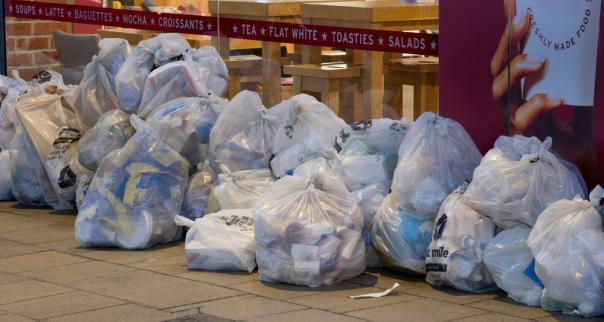
Many catering and food production businesses will be pausing to consider their environmental impact as the government prepares to announce mandatory separate food waste segregation this year.
But what exactly will it mean for you?
The government passed the Environmental Act back in 2021, although food production and catering businesses were given two years to get ready.
Although an official date has yet to be revealed, what it means is that businesses will be required to separate food waste from their general waste and have it collected separately.
When food waste goes to landfill it releases methane, which is 25% more potent than CO2 at trapping heat in the atmosphere and therefore contributing to global warming.
The new legislation is designed to support the government’s decision to halve food waste by 2030 as part of its commitment to sustainable development goals.
The aim, therefore, is to enable the UK to transition away from a ‘single-use, throwaway society’ and to develop a more sustainable, circular economy.
We outline how this may affect businesses and how they can prepare for it.
Who will be affected?
The new legislation will affect all businesses and sectors that generate food waste as part of their day-to-day processes. This may include:
• Catering & hospitality
• Retail
• Healthcare
• Education
• Sporting facilities
• Public institutions
Costings
It’s possible that waste segregation can have a positive effect on your costings. Generally, food waste is quite heavy so disposing of it among your general waste can increase costings. When separated, your general waste should be much lighter.
Segregated food waste, for instance, is up to five times cheaper to dispose of per kilo. Therefore, your general waste will not only be lighter, but overall cheaper to dispose of.
A waste audit may be beneficial to help you itemise your outgoing waste so you can decide how to better manage your processes.
Food waste recycling in action
Some firms may be better prepared for the new legislation than others – particularly in companies which have no segregation of waste streams or little experience of sustainable waste management.
An extra food waste bin will be needed in addition to setting up a new collection day.
When waste is segregated, one novel solution could be to use composters which process all types of food and garden waste.
This effectively transforms food waste into highly-effective fertiliser which can then be used on lawns and other garden areas to help grow fresh fruit and vegetables in line with circular principles.
Typically, minimal resources are required to run such a device. Only around 15-20 minutes of labour is required per day, while the cost of running the composter would only include cheap ‘bulking agents’, such as wood chips and coffee grounds, alongside minimal electric power.
What else can businesses do?
Businesses should be proactive with their approach to food waste. Don’t wait, look at what your options are now.
Some ideas to consider are:
• Separating food waste into a different bin for collection
• Food waste must not be sent to landfill. Send to recycling through composting or anaerobic digestion instead
• Refrain from using macerators or liquidising digestors as these have now been banned completely
And catering operators and businesses should look to follow the food and drink waste hierarchy as outlined by the government. This is an eight step compliance policy, with one being the most sustainable option and eight the worst.
Options 1 to 4 provide guidance on how to prevent food waste, while options 5 to 8 are required by law. Here is the full list:
1. Prevent surplus and waste in your business
2. Redistribute surplus food and drink
3. Make animal feed from former food
4. Process surplus food to make biomaterials
5. Recycle – anaerobic digestion and compostion
6. Recover waste by landspreading
7. Recover energy from waste
8. Dispose – send to sewer and landfill
The introduction of these new food waste regulations will carry the full weight of law and pose a challenge to businesses as they race against time to get their processes in order.